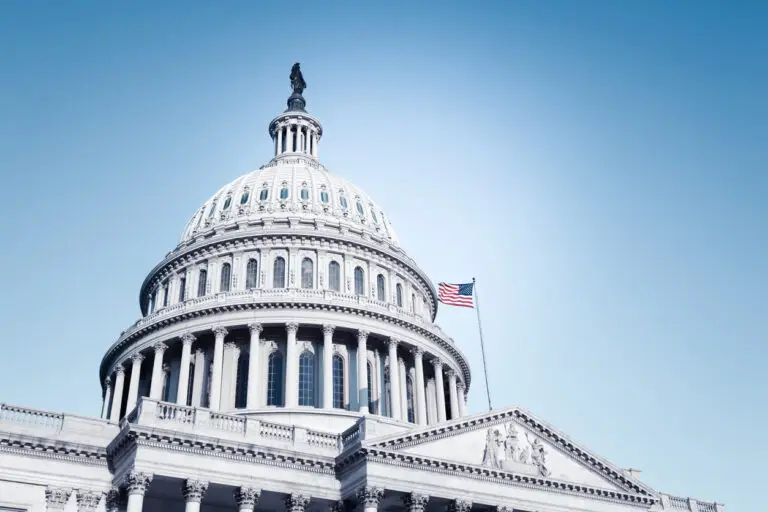How do the Bipartisan Infrastructure Law and other bills advance clean hydrogen?

In a U.S. Department of Energy 2022 news release, Secretary of Energy Jennifer M. Granholm stated:
“Clean hydrogen is key to cleaning up American manufacturing and slashing emissions from carbon-intensive materials like steel and cement while creating good-paying jobs for American workers.”
Major federal legislation to advance clean hydrogen
Congress passed the Bipartisan Infrastructure Law (BIL) in 2021 to support adoption of clean hydrogen as a vital clean energy solution to achieve the U.S. climate goals of 100% carbon-free electricity by 2035 and net-zero carbon emissions economy-wide by 2050.
The BIL contains the following key provisions about clean hydrogen:
- Develop a National Clean Hydrogen Strategy and Roadmap
- $7 billion for Regional Clean Hydrogen Hubs (DOE expects to fund six to 10 hydrogen hubs.)
- $1 billion for a Clean Hydrogen Electrolysis Program
- $500 million for Clean Hydrogen Manufacturing and Recycling Initiatives
Those federal initiatives will expand the use of clean hydrogen in the industrial sector, create jobs, reduce the costs of hydrogen produced from clean electricity and support equipment manufacturing and strong domestic supply chains.
Additionally, the Inflation Reduction Act includes a new hydrogen production tax credit worth up to $3 per kilogram for clean hydrogen meeting a greenhouse gas emissions target of 0.45 kilogram of carbon-dioxide equivalent per kilogram of hydrogen. Clean Hydrogen Production Tax Credit (IRS § 45V)
Hydrogen-related legislation in the states of Oregon and Washington
Oregon
Recent legislation includes:
- SB 1149 allows building renewables that connect directly to an electrolyzer.
- Renewable Portfolio Standard includes eligibility for electricity produced from renewable hydrogen.
- SB 98 allows utilities to sell renewable natural gas (RNG) to customers (RNG includes renewable hydrogen in definition).
- Clean Fuels Program has hydrogen as an eligible fuel for credit generation.
- Zero-Emissions Vehicle Rebates define hydrogen fuel cell vehicles as zero-emission vehicles by law and eligible for the rebates.
- HB 2530 defined “green electrolytic hydrogen” and “renewable hydrogen,” and directed the Oregon Department of Energy to seek and apply for federal funds that would boost Oregon’s hydrogen economy. It also directed ODOE to provide education and increase awareness about these hydrogen types with communities across the state.
- SB 5506 included $200,000 for 2023-2025 to support establishing a regional hub intended to move toward producing green hydrogen fuels.
Washington
Recent legislation includes:
- SB 5910 established an Office of Renewable Fuels at Commerce that directs the department to work with stakeholders and advise on funding and projects related to renewable fuels and green electrolytic hydrogen
This bill also provides $2 million to “promote and strengthen applications for regional hydrogen hub federal funding through state funding assistance to support a timely and competitive application to the United States Department of Energy by a public-private partnership entity that leverages private sector leadership and is composed of multiple interests, including public and private project developers, manufacturers and end users, research institutions, academia, government, and communities around the state.”
- HB 1988 provided incentives for green electrolytic hydrogen manufacturing and storage projects
Earlier legislation:
- SB 5116 Clean Energy Transformation Act (CETA) commits Washington state to an electricity supply free of greenhouse gases by 2045
- 65 RCW Climate Commitment Act (CCA) caps and reduces greenhouse gas (GHG) emissions from Washington’s largest emitting sources and industries, allowing businesses to find the most efficient path to lower carbon emissionsThis legislation also positions environmental justice and equity at the center of climate policy per the Washington State Department of Ecology.
Complementary policies:
- Healthy Environment for All (HEAL) Act to ensure environmental justice is advanced in state environmental policy and programs
- HB 1988 supports clean energy manufacturing projects (including hydrogen and hydrogen-related equipment (such as electrolyzers) and incentivizes the use of labor and community-benefitting tools such as apprenticeship standards and Community Workforce Agreements
Planned efforts:
- The Washington State Department of Commerce will publish a report and recommendations on hydrogen and renewable fuel deployment by December 2023
The Commerce report will include recommendations on policy gaps, pilot projects and additional grant and funding recommendations for consideration by the Legislature.
The years ahead will be exciting for the industry and nation as regional hydrogen hubs evolve. Plus, additional legislation to support clean hydrogen may advance in Congress and many states.